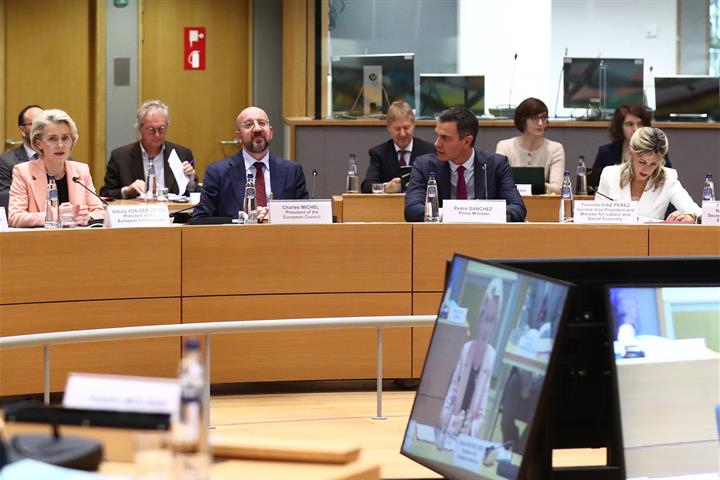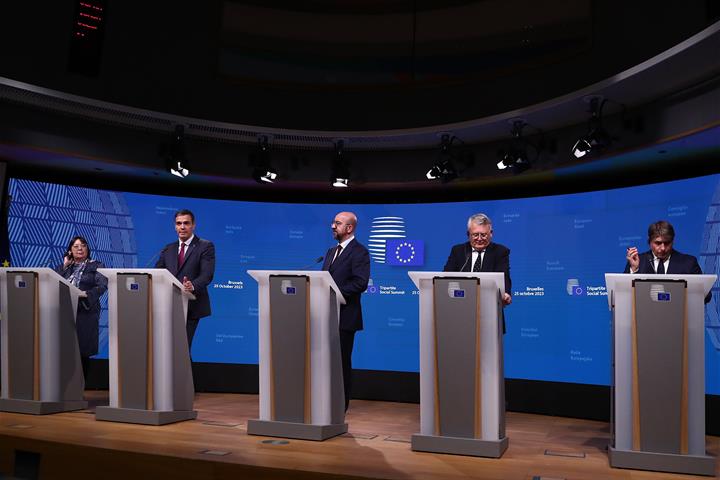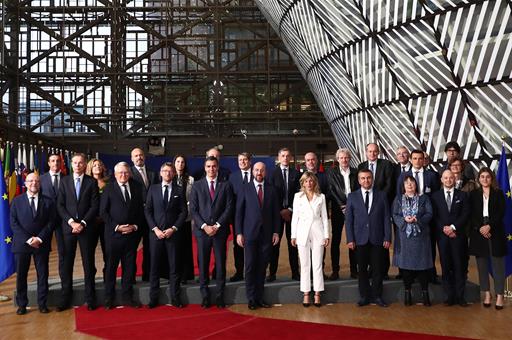Tripartite Social Summit
Sánchez stresses at the Tripartite Social Summit the importance of social dialogue as an engine of progress for the European project
President's News - 2023.10.25
Brussels (Belgium)
In the framework of the Spanish presidency of the Council of the EU, which Spain holds during this six-month period, the acting president, Pedro Sánchez, took part in the Tripartite Social Summit, a forum for dialogue between the EU institutions, represented by their presidents, and the European social partners. On this occasion, the main theme of the Tripartite Social Summit was "Laying the foundations for a successful European economy for workers and enterprises".
This meeting, which took place in Brussels, was also attended by the President of the Commission, Ursula von der Leyen, the President of the European Council, Charles Michel, and the European social partners from BusinessEurope, the European Trade Union Confederation, and the association of companies with services of general interest (SGI), among others. This forum was also attended by the Second Vice-President of the Government of Spain and acting Minister for Work and Social Economy, Yolanda Díaz, who took part in one of the working groups.
During his speech, the acting President Sánchez highlighted the value of social dialogue for the Government of Spain, and conveyed that it is the most solid method for moving forward as it contributes to social and economic stability, while reinforcing the foundations of each public policy regulation in which it features. In this context, he stressed the need to strengthen the Tripartite Social Summit, and highlighted the importance of making this forum a strategic space for decision-making at European level in the future.
Pedro Sánchez has highlighted the decisive role that social dialogue has played in recent years in Spain to promote an ambitious reform agenda and make progress in labour, pensions, gender equality and social protection policies. In this regard, he stressed that the major social agreements have been reached with trade unions and employers' organisations, which makes them today more robust and lasting consensuses thanks to the work carried out with the social partners.
 The President of the European Commission, Ursula von der Leyen, the President of the European Council, Charles Michel and the acting president of the Government of Spain, Pedro Sánchez | Pool Moncloa/Fernando Calvo
The President of the European Commission, Ursula von der Leyen, the President of the European Council, Charles Michel and the acting president of the Government of Spain, Pedro Sánchez | Pool Moncloa/Fernando Calvo
In this regard, the acting president made specific reference to four major agreements resulting from social dialogue: the ERTES, which enabled companies to deal with the economic shock caused by COVID; the increase in the minimum wage of 47% from 2019 to bring it to almost 60% of the average wage; the measures adopted on gender equality, which have helped to reduce the wage gap by 5 points since 2018; and last, the labour reform. On the latter, Pedro Sánchez stressed that since its entry into force, the unemployment rate has been reduced by 2.1 points, which is more than any other of the five largest EU economies. He also stressed that this reform has had a very significant impact in three areas: the reduction of temporary employment by seven points, the reduction of youth employment by more than 30 points and the reduction of long-term unemployment by 25%.
He also stressed Spain's desire to continue to strengthen the social dimension of the six months in which our country holds the presidency of the Council of the EU. The balance at the halfway point of the year is positive in many areas, as the president recalled. Specifically, Pedro Sánchez referred to the adoption of the Council Recommendation for the Development of a Social Economy, and the decision on guidelines for the employment policies of the member states. He also highlighted Spain's willingness to make every effort to make progress and reach agreements with the European Parliament on the directive on working conditions in platform work, as well as the regulation on the coordination of social security and the directive on the European Disability Card.
Pedro Sánchez also stressed the need to strengthen the pillars of the European economy, assuring that the double digital and ecological transition can only be tackled by ensuring that workers, the unemployed and companies have the necessary skills. To this end, he stressed the importance of training workers, especially in sectors that are currently undergoing transformation and have a high potential for job creation. In this context, he referred to industrial dossiers being negotiated under the Spanish presidency, such as the Zero Net Emissions Act and the Critical Raw Materials Act, which maintain a focus on providing sufficient skills to the workforce.
 The Secretary General of the European Trade Union Confederation, the acting President of the Government of Spain, the President of the European Council, the European Commissioner for Employment and Social Rights and the Director General of BusinessEurope | Pool Moncloa/Fernando Calvo
The Secretary General of the European Trade Union Confederation, the acting President of the Government of Spain, the President of the European Council, the European Commissioner for Employment and Social Rights and the Director General of BusinessEurope | Pool Moncloa/Fernando Calvo
The meeting also addressed the economic situation of the EU and how Europe should move towards strategic autonomy and resilience of our economies, while strengthening the European social dimension. They also discussed the importance of upgrading and retraining the skills of the workforce, and recalled the current difficulty Europe is facing in filling vacancies. Eurostat data show that almost three out of every 100 jobs are in this situation. Regarding this challenge, the acting President of the Government of Spain said that it is essential to increase support for workers, paying special attention to the low-skilled, young people, migrants and the unemployed.
Last, Pedro Sánchez referred to the European Year of Skills, an initiative that the President of the Commission, Ursula von der Leyen, made public during her speech in the 2022 State of the Union debate. He valued the suitability of this project, recalling that this is precisely the philosophy behind the broad package of reforms launched by the Government of Spain with the participation of the central and regional governments. In this context, measures such as the new Education Act, the Universities Act and the Vocational Training Act, which has increased the number of students by 23% and doubled the percentage of workers in training processes to 20%, are part of this context.
Pedro Sánchez recalled that one of the priorities of the Spanish presidency of the Council of the EU is to promote greater social and economic justice. In this regard, he highlighted the adoption of the Council Recommendation for the Development of a Social Economy and the decision on guidelines for employment policies in the member states, without forgetting the important conclusions on mental health and precarious work, and on social protection for the self-employed.
The acting president also stressed that skills are today the key to guaranteeing a better future in the field of work and that to avoid possible negative impacts of the digital and ecological transition in certain sectors and territories, it is necessary to continue to make progress hand in hand with business organisations and trade unions, key allies in anticipating and detecting the skills needs of the labour markets.
Non official translation





